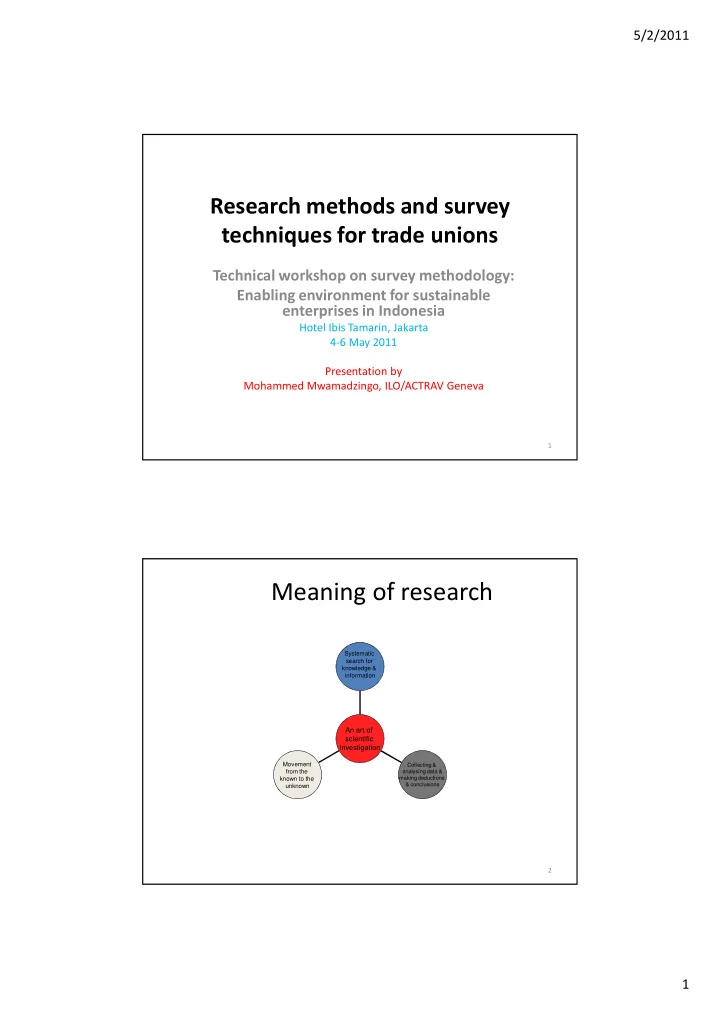

5/2/2011 Research methods and survey techniques for trade unions Technical workshop on survey methodology: Enabling environment for sustainable enterprises in Indonesia Hotel Ibis Tamarin, Jakarta 4-6 May 2011 Presentation by Mohammed Mwamadzingo, ILO/ACTRAV Geneva 1 Meaning of research Systematic search for knowledge & information An art of scientific investigation Movement Collecting & from the analysing data & known to the making deductions & conclusions unknown 2 1
5/2/2011 Purpose and objectives of research Purpose: � Establish systematic, reliable and valid knowledge about the social world. Objectives: � Discover answers to questions through the application of scientific procedures. � Gain familiarity with a phenomenon or to achieve new insights into. www.itcilo.org International Training Centre of the ILO 3 Purpose and objective of research • Portray accurately the characteristics of a particular individual, situation or group. • Determine the frequency with which something occurs or with which it is associated with something else. • Test a hypothesis of a relationship between variables. www.itcilo.org International Training Centre of the ILO 4 2
5/2/2011 The research process • Topic • Statement of the problem • Objectives • Research Questions • Literature review • Data collection • Data Analysis • Report writing 5 Typologies of trade union research • Undertake research on employment and social issues that are of relevance to trade unions. • Generate sound, up-to-date and credible labour statistics on unemployment, non-standard employment, child labour, force labour, labour markets, women’s participation in the labour force, safety and health at work, social security, collective bargaining, organising and a broader range of other topics associated with the measurement of decent work. • Scrutinise public policies and prepare union responses, comments and submissions. 6 3
5/2/2011 Typologies of trade union research • Provide statistics which trade union leaders can use to effectively communicate cogent arguments during policy-making and policy review exercises. • Collect, analyse and interpret information on wages, conditions of employment, company productivity and profits, companies’ balance sheets, economic trends in the industry and country as a whole, job grading, cost of living, pension/provident funds, etc. • Make regular contacts with union branches and shop stewards to assess progress and impact on CBAs. 7 Typologies of trade union research • Collect, analyse and interpret data on key challenges facing the trade union movement e.g. membership decline, fragmentation and proliferation, gender inequality, organising informal economy workers, etc. • Coordinate statistical activities across the affiliates of the national trade union centre and monitor their qualities. • Create reliable statistical database for trade unions. 8 4
5/2/2011 Ethical considerations for trade union research • Voluntary participation: participants should voluntarily decide to participate in a research project after being explained as to what the research is about and what is expected from the participants. No harm should be imposed to participants: the research process should • not involve any kind of emotional, psychological or physical harm. • Anonymity and confidentiality: the identity of the participants should be protected. The researcher should promise not to identify the participant publicly. Deceiving participants: Researchers should never deceive the participants • about who they are, what they are doing and why they are conducting that research. • Analysis and reporting: researchers should always be ready to disclose research methodology used and techniques of analysis. Limitations of the findings and the methodological constraints should be stated in the report. Data should not be misrepresented. 9 5
Recommend
More recommend